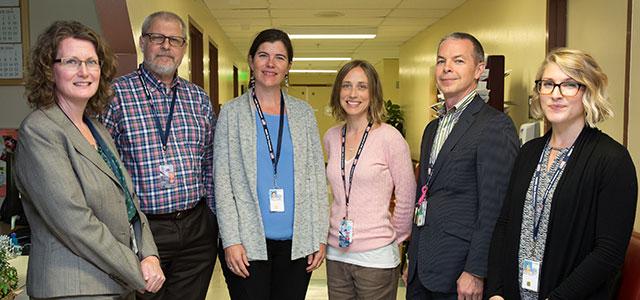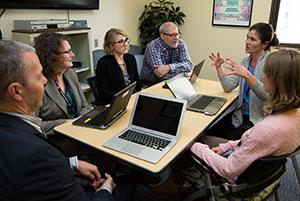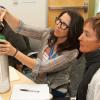
Elaine Conroy, PMHNP resident; Charles Primich, UCSF-SFVA project director; Rosalind De Lisser, UCSF-SFVA project director; Bethany Sullivan, PMHNP resident; Matt Tierney, UCSF-SFVA faculty; Katelyn Brady, PMHNP resident. (Elisabeth Fall Photography)
Partnership with SFVA Creates Rare Residency for Psychiatric/Mental Health NPs
When presidential candidate Hillary Clinton announced a “comprehensive” mental health agenda that recognizes some 40 million Americans are coping with a mental health problem, it was a pretty good indicator of how far public awareness has come in understanding the toll that mental illness can take on individuals, families and communities. By most accounts, raised awareness is a good thing.
The challenge is that it also increases demand for mental health professionals – a demand, as we noted in a 2014 commentary, for which many health care settings are not prepared. This has led to widespread interest in the recruitment and preparation of psychiatric/mental health nurse practitioners (PMHNPs) as primary mental health providers, especially because they are knowledgeable prescribers.
That demand is also a driver for a recent partnership between UC San Francisco School of Nursing and the San Francisco VA Health Care System, which is charged with addressing the often demanding mental health needs of the area’s military veterans. One of 18 Veterans Affairs Nursing Academic Partnerships in Graduate Education (VANAP-GE) around the country, the UCSF-SFVA project is a five-year collaboration focused on both scholarship and clinical training for PMHNPs. In addition to providing rotations for PMHNP students, the partnership includes a rare postgraduate residency, the first of its kind in California.
“Our partnership speaks to a tremendous need for more well-prepared mental health clinicians across the country, as well as the need to build the infrastructure for more academic collaboration between schools of nursing and the VA,” says Rosalind De Lisser, project director for the VANAP-GE and co-director of the School’s PMHNP program. De Lisser has worked in integrated roles in public and military mental health for more than a decade.
“One of the goals is to introduce [PMHNP students and recent graduates] to what the VA can do for you as a provider in the hope that [they] will stay on with us,” says Charles Primich, an assistant clinical professor, who has been working at the SFVA since graduating from Yale’s NP program five years ago. He co-directs the UCSF-SFVA project, along with faculty members Matthew Tierney, Bethany Phoenix and Mary Ann Nihart, who is also clinical director and chief nurse for ambulatory care at the SFVA.
How It Works
The UCSF-SFVA project has multiple components. School faculty members receive joint appointments at the VA, and VA clinicians become volunteer clinical faculty at the School. This facilitates first- and second-year rotations for master’s-level PMHNP students from the School as well as the postgraduate residency, which this summer accepted its first three residents after a nationwide search.
A first-year trainee spends 10 weeks, one day a week, doing a rotation in specialized mental health, such as psychiatric emergency or diagnostic interviewing, while a second-year trainee does a 10-month rotation, two to three days a week in clinic, following a cohort of patients.
In contrast, the postgraduate residency is a 40-hour-a-week commitment, says De Lisser, with about 65 percent face-to-face clinical time and the rest didactics and supervised discussions. The classroom work includes sessions on a range of topics in veteran-centric mental health with psychology, social work and psychiatry trainees, as well as role-specific didactics for PMHNPs. Residents also engage in leadership training and professional development, including having to complete a quality improvement capstone project. Instruction and supervision are often interprofessional.
“We’ve built the curriculum around four anchor themes: PMHNP role development, interprofessional collaboration, leadership and self-reflection, and systems improvement,” says De Lisser. “We also want residents to get accustomed and exposure to the culture of veterans and veterans’ mental health care – in order to build their commitment to excellence in both practice and scholarship.”
The first three themes have already been set in motion and will continue throughout the year, while the fourth anchor theme – systems improvement – will be introduced later, as it relates to quality improvement and the capstone project.
The VA and the Role of the PMHNP
 “Our partnership speaks to a tremendous need for more well-prepared mental health clinicians across the country, as well as the need to build the infrastructure for more academic collaboration between schools of nursing and the VA.” – Rosalind De Lisser
“Our partnership speaks to a tremendous need for more well-prepared mental health clinicians across the country, as well as the need to build the infrastructure for more academic collaboration between schools of nursing and the VA.” – Rosalind De Lisser
Bethany Sullivan had been a hospice nurse for eight years when she entered the School’s PMHNP program, which she completed in 2016. She leaped at the chance to enter the postgraduate residency component of the UCSF-SFVA project.
“I did my second-year internship at the VA, and this just seemed like a natural transition between finishing school and getting additional skills, experience and mentorship,” she says. “I wouldn’t have felt comfortable going straight into practice. I understand why others would feel differently, but it felt very necessary for me to feel confident. You can't get this kind of exposure in just two years of school, and I wanted to be a sponge and learn from all these people.”
She points to the broad exposure she is receiving in different specialty areas as a way to better understand the role and necessary expertise of the PMHNP both generally and specifically at the VA. She has already worked in clinics ranging from substance abuse, mood disorders and rehabilitation through psychiatric outpatient and an access center.
But because the PMHNP postgraduate residency is still in its first year, both faculty and students are still working out what exactly the NP’s role should be in each of the clinics – a discussion that is occurring in many health care settings. “There was a time when the physicians here didn’t know what to make of us at all,” says Primich, who is also an accomplished researcher. “But that’s changed over the last five years. This is a very pro-NP environment, and the SFVA is pushing hard to hire more psych NPs, and we are very used to working to our full capacity.”
He notes that PMHNP training tends to bring a more holistic approach, which includes – but also looks beyond – prescribing and is characterized by a strong awareness of how to work in teams. “I will explore whatever therapy modality works…and while I work independently at times, I also feel very comfortable working with psychiatrists, social workers and others,” he says.
Interprofessional Collaboration
That comfort level is important at the VA, where team-based care is strongly emphasized. Thus, PMHNP residents spend a lot of time exploring how to interact with psychologists, psychiatrists, social workers, psychiatric residents and other professionals, who all come at care delivery from different perspectives, generations and personalities, which rarely fit textbook definitions.
“In the general psych clinic, every morning we meet with other psych residents and attendings and an NP supervisor to review [complex] patients…and it’s a great interdisciplinary approach,” says Katelyn Brady, another of the first crop of PMHNP postgraduate residents. Brady earned an undergraduate degree in psychology at UC San Diego and worked for UCSD before completing the UCSF School of Nursing’s Master’s Entry Program in Nursing and earning her master’s in psychiatric/mental health nursing in 2016. “As a new provider, it has been very beneficial to have attendings and supervisors available to consult with about psychotropic medications. I have become much more familiar with and comfortable prescribing medications since I started in July.”
Sullivan adds that the team-based care sparks insights into what’s possible, when it’s working well and even when it’s not. “My weekly shift at the psychosocial rehabilitation center feels very interprofessional, with occupational therapy, RNs, nurse practitioners, physical therapists and psychologists in different groups to discuss patients,” she says. “That sense of togetherness and collaboration is not 100 percent in every setting, but part of the residency involves trying to break down walls, to get people more used to NP integration and collaboration.”
Mentoring and Self-Reflection
Despite the obvious rewards, both Sullivan and Brady acknowledge that the workload and learning pace can be demanding. De Lisser says she and her faculty colleagues understood that going in, so they carefully built mentoring and self-reflection into the curriculum.
In part, this is achieved by having residents conduct patient visits with a supervisor – or doing the visit alone but reporting to a supervisor immediately afterward to work out a care plan. “I could be seeing an older veteran, who has long-standing, complex psychiatric history and multiple medication trials,” says Sullivan. “Teasing apart the psychiatric and medical and what’s contributing to what is incredibly complex. Nobody has [all] the answers, but having the opportunity to discuss [such cases] with a mentor is so important.”
In addition, there are weekly conferences where the residents meet with one of their supervisors for more freewheeling discussion, often about how they are dealing with the challenges of the job.
“There’s a real emphasis on personal reflection when I meet with Matt [Tierney] to discuss my progress, deficits and opportunities for growth,” says Brady.
Primich, who supervises in both the general intake and mood disorders clinics, says, “It’s great, because it’s stretching me too. The learning opportunities work both ways, and that’s what I love about being here.”
A Remarkable Opportunity
Because the PMHNP postgraduate residency is so new, there are a lot of opportunities to improve it – and both faculty and the residents themselves are keeping their eyes open for those opportunities.
“We’ve been getting a lot of great feedback, and the residency will change and evolve based on input from the residents, preceptors and supervisors. I know the VA is interested in more, and I see it [the residency] increasing in scope,” says Primich. “But even right now, the residents are getting real-world opportunities, seeing real-world people and experiencing the kind of pressures that go along with that, while also having support, supervision and didactic instruction. It’s a chance to really build your chops.… I wish I had something like this when I graduated.”
“It’s a great way to start a career, and in general, I’m loving it; it’s exceeded my expectations,” says Brady. “The SFVA is a fantastic place to work, and I have been very impressed with the support and resources available to clinicians. And as a new grad, you can’t put a price on good supervision. Every new provider has that sense of being a fraud at first, even after graduating from a top-tier school like UCSF. I chose to complete this residency not because I do not feel prepared to practice as an NP, but for the purpose of being more prepared.”



